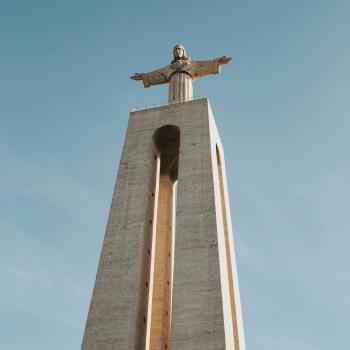A FAITH IN GOD FOR TODAY
…There is no God up there, or out there, or wherever, who entertains our petitions and answers sometimes positively, sometimes negatively, sometimes not at all. Such an image is the product of the collective human imagination, taking shape over the ages. Anthropomorphic imagery (“measuring” God according to human standards) is a contrivance, a concession, that makes a certain kind of prayer possible on our terms. It is not to be taken literally. God is pure spirit, the Creative Spirit, the ultimate source of life and love and all that is. Through that Creative Spirit this vast universe, you and I included, has come into being and is sustained. We trivialize the Great Spirit when we reduce it to a humanoid creation of our own, no matter what the Scriptures have to say.
The purported “words of God” down the ages are human words that seek to give expression to some aspect of the divine presence. There is no supernatural being that observes, much as we do, the situation of human beings. But there is everywhere and always the divine spirit, the Creative Spirit, living and loving in all things animate and inanimate. To be consciously, deliberately united with that indwelling spirit is in itself a source of abiding strength and hope. It is our assurance that ultimately justice and peace and love and goodness will prevail.
Do not we, who have been fortunate enough to have lived into a new millennium, have the obligation, the responsibility, of examining critically that belief system, built, as it is, on foundations that can no longer be defended? Past generations have done their very best to interpret and articulate the mystery of God’s presence in their lives; do we have the moral right to do less?
Non-scholar that I am, I rely on the ordinary reading and learning and praying and practical experiences that have filled my life in order to discern the evolution of truth, encouraged by the wise insistence of the church on the primacy of individual conscience. I depend heavily also on the insights of contemporary theologians and scholars in the resolution of those doubts and instincts that are inevitably an integral part of any sincere faith journey. I also look to the consensus of a rapidly increasing number of Catholics in whose faith I find resonance of my own.
Jesus was scorned for attempting to redefine God. He rebuked his detractors by telling them that they were like the old garment that could not accept a new patch, or like an old wine sack that could not hold the new yield. I reveal God to you in a new way, he said to them equivalently, but you are so wedded to your old mindset that you cannot hear and receive what I am saying.
I am convinced that the situation is much the same today: The Spirit of Truth is speaking to us through the insights of a broad range of human sciences, and many are paralyzed by fear of letting go of the familiar, the traditional. Who is the sage who commented, “Tradition is the living faith of the dead; traditionalism is the dead faith of the living”? Amen!
From the whole of Jesus’ life and teachings, at least as far as I know and understand them, I deduce the following as belonging to the basis of a faith for today:
• God and we are never apart: God is not “up there” while we are “down here.” God is in us, the way two persons are in each other in a union of love – only infinitely more so.
• We and God struggle together; God does not exist in some far-off place, watching, engineering, directing, responding. God is the empowering energy of everything we are and everything we do. God’s “kingdom” is within us. God is in everything as the ground of its being; were God not there, it would not be.
• We can’t control or manipulate God. We never did, never will, no matter what prayers we say or sacred actions we perform. Nor does God control us; we are always free.
• God is the deepest foundation of our being. (Centering prayer seeks the God within.)
• God is love, and when we love in any way we are actively living in God.
• Our one, common, universal calling is to be good human beings, to live up to our creaturely mandate by caring for others as we care for ourselves, by struggling to overcome our selfish- ness, by forgiving generously, by moving on in hope even in the worst of times, etc.
• Our prayers and sacred rituals don’t save; they don’t protect us or win special favors or anything like that. They celebrate the relationship between us and God, between us and all other creatures. They remind us of God’s loving presence to us and encourage us to look forward to that life of perfect union with the Creator that we are destined to enjoy after our biological death.
So much for a starter, if only to suggest that our old, inherited, false images of God result in needless pain and confusion, causing people of good will and generous love to live in fear of an offended, punishing God, whose requirements for their entrance into eternal life are onerous and all but unachievable. Crippled by such fear of a God who is the product of human imagination, no one can be life-giving to anyone else. “I have come,” Jesus said, “that you may have life and have it in abundance.”
3/5/2019 10:20:04 PM




